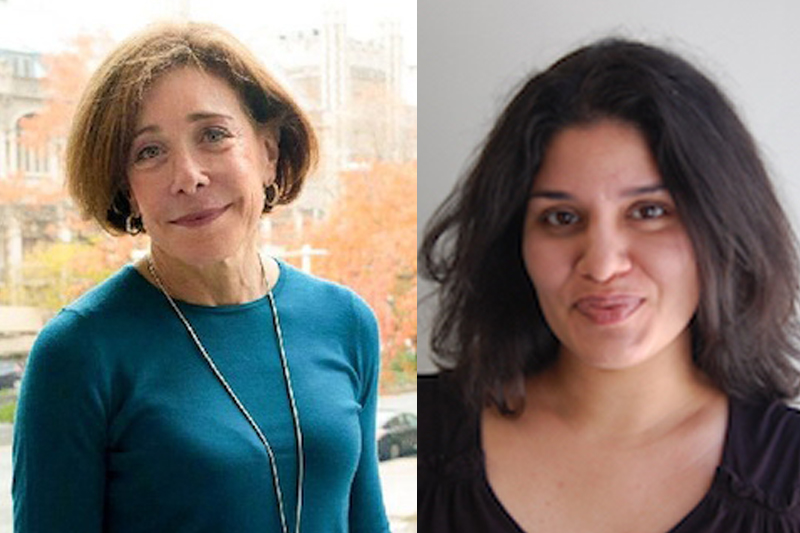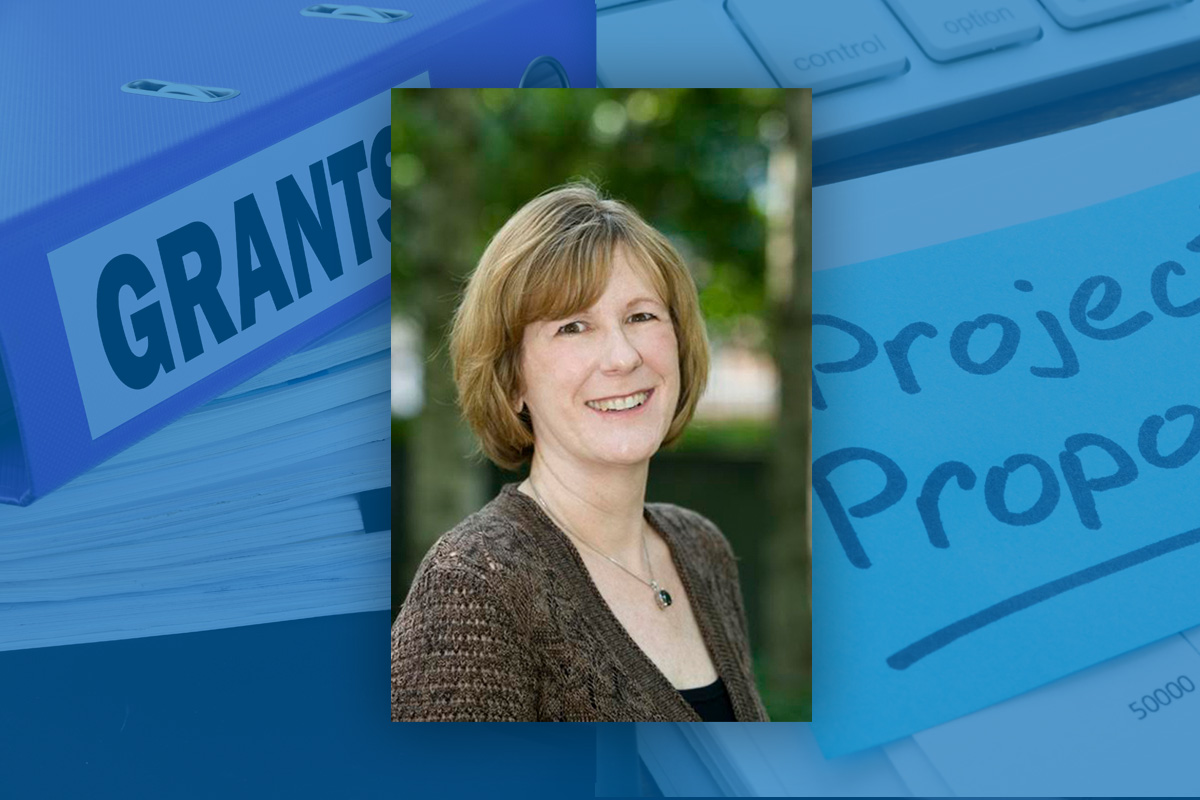Not long ago, when the W.K. Kellogg Foundation announced a national competition for a $20 million multidisciplinary grant focused on racial equity, Teachers College went into rapid response mode. A team of nine faculty members from eight departments and programs quickly got together and began work on a preliminary application, including a video. Should they be chosen as finalists, they are poised to recruit additional researchers from across the College to promote an anti-racist movement in education and plunge into a year-long planning period to compete for the big prize.
In the past, such opportunities would certainly have attracted interest at TC, but a serious bid might have been hobbled by the inability to rapidly assemble the right players and tap the necessary resources.
This time, though, the Kellogg grant effort received a major boost from the office of Carol Hammer, who last summer was named Teachers College’s first Vice Dean for Research.
Hammer’s team includes several different contributors from across the College who touch on research in different ways, but who, until very recently, worked in separate silos. Among them, Charlisa Garg, Director of Corporate & Foundation Relations, got the first notice about the Kellogg competition. Garg immediately informed Hammer, who quickly spread the word to faculty members working in areas most relevant to the grant’s focus. The group that came together has since received support from the College’s Office of External Affairs and Office of Sponsored Programs in creating its application package. If the grant comes through, other offices now working with Hammer will help them process it, track spending, report results and other critical tasks.
Our vision is to create a seamless system, from pre- to post-award of each grant, that is centralized and coordinated.
—Carol Hammer, Vice Dean for Research
“This is a great project for us to get behind, because it really dovetails with two of the College’s priorities — enhancing diversity, equity, inclusion and justice, and promoting interdisciplinary research,” Hammer says. “We’re very excited about this work, and even if our team does not win the competition, the connections and synergies they have created will be well worth it.”
The Kellogg grant is only one example of why TC created Hammer’s job — and why Hammer, in particular was chosen to inaugurate it.
“TC does more than $50 million annually in funded research, but on a per capita basis, we trail other top-ten education schools in grant dollars,” says TC Provost and Dean Stephanie J. Rowley. “We want to change that picture by helping more faculty to submit grants for the first time; by encouraging those whose grants were initially rejected to revise and re-submit their proposals; by boosting our track record of winning large, multimillion grants, not just among big centers but by individuals as well; and, especially, by winning more cross-disciplinary grants. Because what’s truly unique about TC is that we have top people working in education, health, psychology and leadership, and that gives us the opportunity to take a single issue and approach it in a really rich, interdisciplinary way.”
Rowley calls Hammer — the recipient of more than $25 million in federal funding for her own research and a past member of review panels for the National Institutes of Health and the Institute of Education Sciences — “an ideal pick for this position” who “truly values intellectual diversity and possesses the broad interdisciplinary experience to inclusively navigate the many different intellectual and methodological traditions at TC and promote greater interdisciplinary collaboration.”
Hammer and her team have since conducted an extensive evaluation of the research landscape at TC and established three goals for achieving “research excellence.”
- Strengthening the infrastructure to improve communication across the College’s research ecosystem
- Increasing the number of grant submissions and awards, including interdisciplinary center grants
- Enhance the research culture and the visibility of research at TC
“We’ve really focused on the first goal, because without a strong infrastructure, faculty won’t be able to accomplish the other priorities,” says Hammer, who also teaches a TC course on grant writing. “Our vision is to create a seamless system, from pre- to post-award of each grant, that is centralized and coordinated.”

LEARNING AT ALL LEVELS Both veteran researchers like Distinguished Research Professor Priscilla Wohlstetter (left) and early-career ones like Prerna Arora, Assistant Professor of Psychology, say the Vice Dean's office has given them new insights into the grant-getting process. (Photos: TC Archives)
To that end, Hammer’s group recently centralized all of this information on a new website, Research@TC, billed as “a one-stop location for everything related to research at TC.” The website includes resources for faculty including: the repository of successful grant applications, helpful videos from funders, videos of webinars on grant writing, and a repository of research datasets that are publicly available. In addition, the website features internal and external funding opportunities along with databases of funding opportunities.
A new monthly newsletter, also called Research@TC, shares pertinent announcements from research offices at TC as well as announcements of new foundation and federal funding opportunities. And the Vice Dean’s office is also flagging opportunities such as the Provost’s Investment Grants, which seed new research, and the diversity grants given by the College’s Office for Diversity & Community Affairs.
Hammer’s office has also developed a series of webinars on grant writing and is in the process of developing a database of funding opportunities and another database to help faculty find colleagues within TC who are potential collaborators.
I learned so much from your presentation, even though my career has been built upon grants from foundations and federal funding. You broke proposal sections down into easily manageable nuggets. Referring back and forth to different funding sources really helped us to apply your advice to individual situations.
—Priscilla Wohlstetter, Distinguished Research Professor, thanking Carol Hammer, Vice Dean for Research
These efforts are clearly attracting notice. After attending a seminar on grant writing, Priscilla Wohlstetter, Distinguished Research Professor in the College’s Department of Education Policy & Social Analysis, emailed Hammer, “I learned so much from your presentation, even though my career has been built upon grants from foundations and federal funding. You broke proposal sections down into easily manageable nuggets. Referring back and forth to different funding sources really helped us to apply your advice to individual situations. Many thanks for helping TC faculty at all levels of their careers.”
But it may be that the Vice Dean’s Office is making a particularly strong impact on the work of younger faculty.
For example, Prerna Arora, Assistant Professor of School Psychology, used a Dean’s Faculty Diversity Research Award to collect pilot data for a proposal that she submitted in February to the National Institutes of Mental Health (NIMH) together with Elizabeth Connors, a faculty member at the Yale University School of Medicine. The two are seeking an R34 grant, which supports initial development of a clinical trial, to test a novel approach to ensuring that youth of color who are experiencing depression and suicidality remain in therapy.
Having this kind of support is so helpful — not just because of the tactics you learn, but also just having people in your corner who have been through this and know it can be done.
—Prerna Arora, Assistant Professor of School Psychology
Arora also used a Provost’s Award for Grant Writing Coaching to support a senior person in her field — someone with extensive grant funding in the grant’s area of focus — to provide scientific feedback on the proposal. And through Hammer’s office, she was able to get extensive feedback from a senior TC faculty member — someone not in her field, but with experience submitting grants.
“Grant writing is definitely a difficult process,” Arora says. “It takes a lot of time and effort, and new applicants often aren’t funded on the first try. So, you have to think long-term. And having this kind of support is so helpful — not just because of the tactics you learn, but also just having people in your corner who have been through this and know it can be done.”
